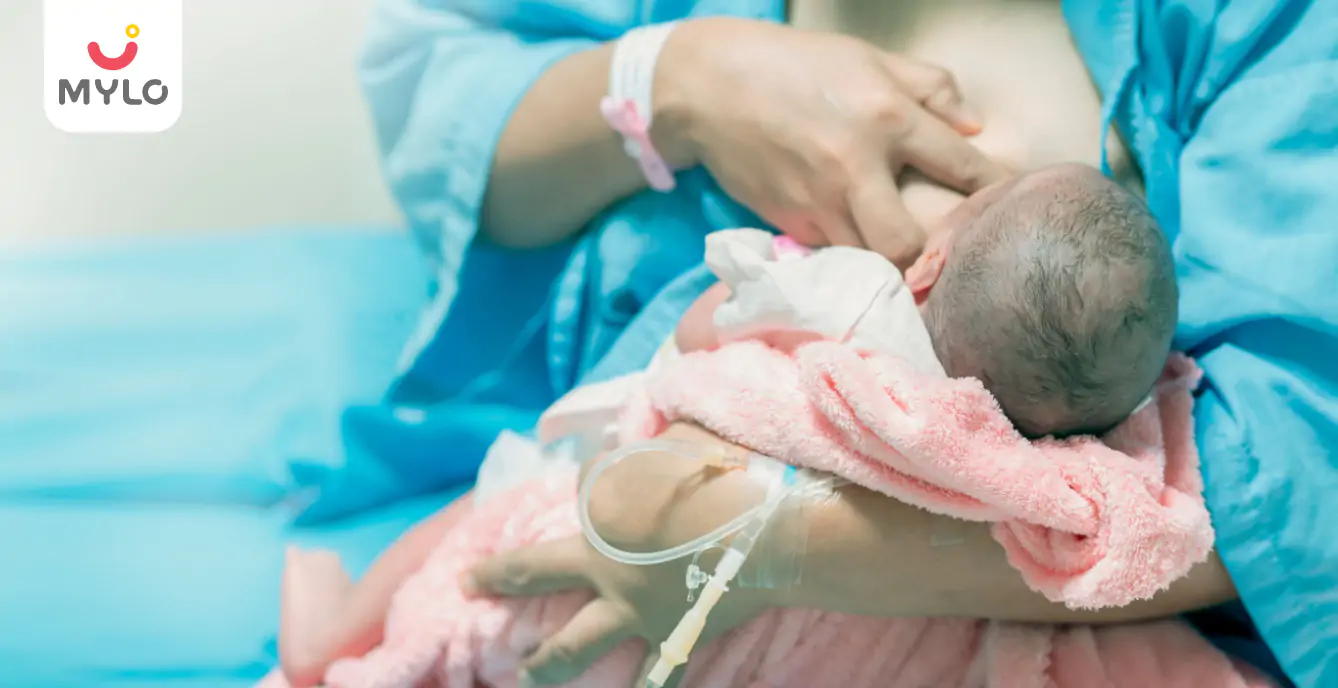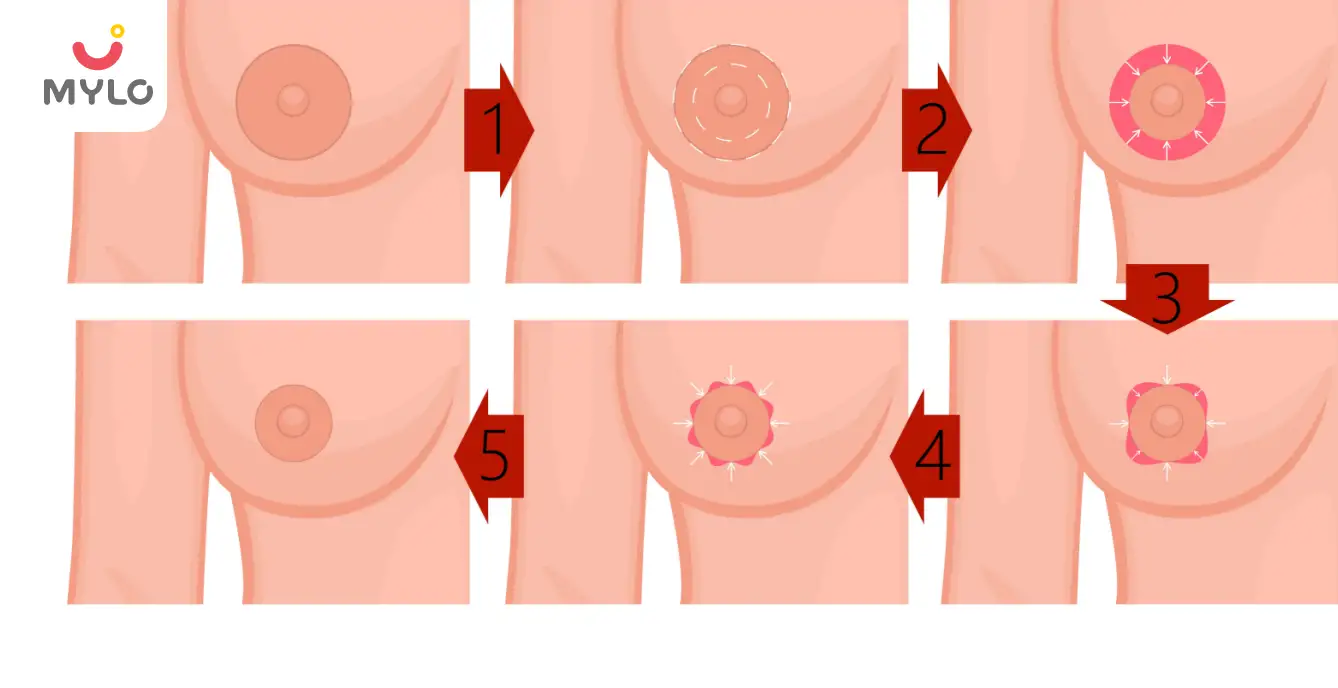Home

Care for Baby

Port Wine Stain Birthmark: Symptoms, Causes & Treatment
In this Article

Care for Baby
Port Wine Stain Birthmark: Symptoms, Causes & Treatment
Updated on 28 October 2023
A port wine stain birthmark is a permanent birthmark that usually appears on the face. It starts as a flat pink or red coloured patch on a newborn’s skin but may get larger, darker and thicker.
In this article, we will discuss in detail about the port wine stain birthmark, its symptoms, causes, diagnosis and treatment of port wine stain.
What is port wine stain birthmark?
Port wine stain birthmark as the name sounds looks like wine spilt on an area of the body. They usually appear on the face, neck, arms or legs and can be of any size. They grow as the child grows and may darken and thicken over time unless treated. They usually look pink upon birth but tend to become reddish-purple or dark red as the child grows. It is also known as nevus flammeus.
You may like : Can Eclipses Be Harmful to You or Your Baby During Pregnancy?
Symptoms of port-wine stains birthmark
Here are some of the most common symptoms of port wine stain birthmark:
-
A port wine stain birthmark looks like a pink, red or purplish blotch on the skin.
-
It has clear distinctions where the birthmark starts and stops.
-
These birthmarks appear most commonly on the face, neck and scalp.
-
Port wine stains are usually pinkish and smooth but as the child grows the birthmark does too in size and colour.
-
Port wine stains may also bleed after an injury and become difficult to manage.
Causes of port wine stain in babies
Port wine stain birthmark results when capillaries (tiny blood vessels under the skin) are formed abnormally. The capillaries dilate, meaning they become more open or stretched than usual. Although scientists aren’t sure what causes abnormal capillaries, there have been cases where multiple people in the family have it.
You may like : Birthmark: Types, Causes, Risks & Treatment
How is a port wine stain birthmark diagnosed?
Doctors can identify a port wine stain birthmark by looking at a child’s skin. Port wine stains are usually harmless but sometimes, they may be a sign of an underlying condition. For example, doctors may monitor port wine stains near the eye or on the forehead as they may be linked to a rare neurological disorder called Sturge-Weber syndrome. Stains on the eyelids may even lead to glaucoma.
In case there’s a concern about the location of the port wine stain birthmark, doctors may recommend eye tests, X-ray, CT scan or MRI to see what’s going on. If a child has a port wine stain birthmark anywhere on their body, it’s important to get it checked and treat it, if need be.
Are port wine stains harmful?
A port wine stain birthmark is usually harmless and doesn’t cause any pain or medical problem. However, sometimes port wine stains can occur in people with Sturge-Weber syndrome or Klippel-Trenaunay Syndrome. People born with either of these syndromes have abnormally formed capillaries in parts of their body and should be examined for complications.
If a port wine stain birthmark becomes larger or raised later in life, it may become a symptom or cause of any other medical issues. For instance, the stain may begin to bleed easily if the skin is injured. If the port wine stain is around the eyes of a person, they may have a higher risk of glaucoma.
What are the treatments for port wine stain?
Port wine stains usually don’t require medical treatment but, in some cases, they may need to be treated. The most common way to treat a port wine stain birthmark is laser therapy. Laser therapy helps to shrink the blood vessels and fade the mark. This treatment is most effective when the patient is younger as the blood vessels are smaller.
Laser therapy treatment is usually brief and last for only a few minutes. Most people need the treatment repeatedly for a couple of months. The laser may make the skin sore or red and if the treatment is painful, you can ask for a numbing spray or cream. Children who are very young may even receive general anesthesia so they can sleep through the treatments.
How can I prevent port wine stains?
Doctors and scientists are still unsure as to what causes a port wine stain birthmark. Since they exist upon birth and are not caused by anything done during pregnancy, there is no way to prevent a port wine stain birthmark.
References
1. Nguyen V, Hochman M, Mihm MC Jr, Nelson JS, Tan W. The Pathogenesis of Port Wine Stain and Sturge Weber Syndrome. (2019). Complex Interactions between Genetic Alterations and Aberrant MAPK and PI3K Activation. Int J Mol Sci.
2. Minkis K, Geronemus RG, Hale EK. (2009). Port wine stain progression: a potential consequence of delayed and inadequate treatment? Lasers Surg Med.



Written by
Anupama Chadha
Anupama Chadha, born and raised in Delhi is a content writer who has written extensively for industries such as HR, Healthcare, Finance, Retail and Tech.
Read MoreGet baby's diet chart, and growth tips

Related Articles
Related Questions
Hello frnds..still no pain...doctor said head fix nhi hua hai..bt vagina me pain hai aur back pain bhi... anyone having same issues??

Kon kon c chije aisi hai jo pregnancy mei gas acidity jalan karti hain... Koi btayega plz bcz mujhe aksar khane ke baad hi samagh aata hai ki is chij se gas acidity jalan ho gyi hai. Please share your knowledge

I am 13 week pregnancy. Anyone having Storione-xt tablet. It better to have morning or night ???

Hlo to be moms....i hv a query...in my 9.5 wk i feel body joint pain like in ankle, knee, wrist, shoulder, toes....pain intensity is high...i cnt sleep....what should i do pls help....cn i cosult my doc.

Influenza and boostrix injection kisiko laga hai kya 8 month pregnancy me and q lagta hai ye plz reply me

RECENTLY PUBLISHED ARTICLES
our most recent articles

Celebrate Breast Feeding Week
Colostrum or First Milk : A Complete Guide About Its Meaning, Benefits & Side Effects

Ayurveda & Homeopathy
Ayurvedic Medicine for White Discharge: A Guide to Discovering Natural Solutions

Women Specific Issues
The Ultimate Guide to Estrogen-Rich Foods and Their Benefits

Ayurveda & Homeopathy
Ayurvedic Medicine for Erectile Dysfunction: A Guide to Discovering Natural Solutions

Women Specific Issues
Big Areolas: A Comprehensive Guide to Causes, Risks and Treatments

Anaemia
Anemia During Pregnancy: Symptoms, Causes & Management
- The Benefits and Risks of Using Hydrocortisone Cream for Babies
- The Ultimate Guide to Planning for Second Baby
- The Ultimate Parent's Guide to Dealing with Boils in Babies
- 2 Months Pregnant Belly: Understanding Your Belly and Baby's Transformation
- The Significance of Trilaminar Endometrium in Fertility: What You Need to Know
- Kanchanar Guggulu: Your Ultimate Guide to a Healthy Lifestyle
- First Trimester of Pregnancy
- Top 10 Comedy Movies on Hotstar to Make You Laugh Your Heart Out
- Stages of Pregnancy by Trimester
- Your Streaming Guide to the Best Web Series on Hotstar in Hindi
- Top Romantic Movies on Hotstar That'll Melt Your Heart
- When to Have Another Child: Timing and Tips
- Top 10 Benefits of Triphala: Discover the Hidden Health Secrets
- Ayurvedic Medicine for Irregular Periods: Discovering Ancient Remedies for Hormonal Harmony


AWARDS AND RECOGNITION

Mylo wins Forbes D2C Disruptor award

Mylo wins The Economic Times Promising Brands 2022
AS SEEN IN

- Mylo Care: Effective and science-backed personal care and wellness solutions for a joyful you.
- Mylo Baby: Science-backed, gentle and effective personal care & hygiene range for your little one.
- Mylo Community: Trusted and empathetic community of 10mn+ parents and experts.
Product Categories
baby carrier | baby soap | baby wipes | stretch marks cream | baby cream | baby shampoo | baby massage oil | baby hair oil | stretch marks oil | baby body wash | baby powder | baby lotion | diaper rash cream | newborn diapers | teether | baby kajal | baby diapers | cloth diapers | laundry detergent 6472 | lactomama lactation granules |




